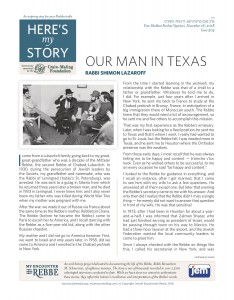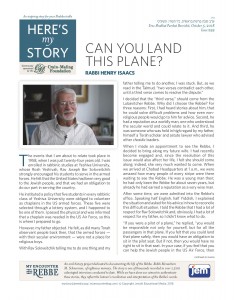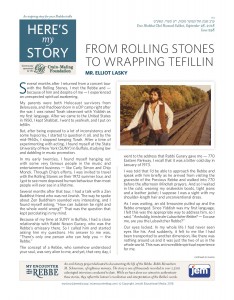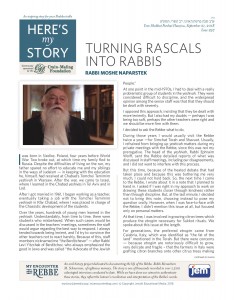Our Man in Texas
I come from a Lubavitch family going back to my great, great-grandfather who was a disciple of the Mitteler Rebbe, the second Rebbe of Chabad-Lubavitch. In 1930, during the persecution of Jewish leaders by the Soviets, my grandfather and namesake, who was the Rabbi of Leningrad (today’s St. Petersburg), was arrested. He was sent to a gulag in Siberia from which he returned three years later a broken man, and he died in 1933 in Leningrad. I never knew him, and I also never knew my father who was killed during World War Two when my mother was pregnant with me.
After the war, we made it out of Russia via France about the same time as the Rebbe’s mother, Rebbetzin Chana. The Rebbe (before he became the Rebbe) came to Paris to escort her to America, and I recall dancing with the Rebbe as a five-year-old kid, along with the other Russian chasidim.
My mother and I did not go to America however. First, we went to Israel and only years later, in 1958, did we come to America and I enrolled in the Chabad yeshivah in New York.
From the time I started learning in the yeshivah, my relationship with the Rebbe was that of a child to a father or grandfather. Whatever he told me to do, I did. For example, just four years after I arrived in New York, he sent me back to France to study at the Chabad yeshivah in Brunoy, France, in anticipation of a big immigration there of Moroccan youth. The Rebbe knew that they would need a lot of encouragement, so he sent me and five others to accomplish this mission. (more…)






 Pursuant to an original round of interviews which were featured in Faithful and Fortified Volume One (see trailer below), we will be conducting an additional 60 interviews with Israeli security, intelligence, journalists and government officials who had meetings and correspondence with the Rebbe about protecting Israel. These interviews are being made possible through an generous grant by Rabbi Yossel Gutnick, the Rebbe’s emissary for Shleimus Ha’aretz.
Pursuant to an original round of interviews which were featured in Faithful and Fortified Volume One (see trailer below), we will be conducting an additional 60 interviews with Israeli security, intelligence, journalists and government officials who had meetings and correspondence with the Rebbe about protecting Israel. These interviews are being made possible through an generous grant by Rabbi Yossel Gutnick, the Rebbe’s emissary for Shleimus Ha’aretz. story of the Lubavitcher Rebbe, of blessed memory’s life.
story of the Lubavitcher Rebbe, of blessed memory’s life.

